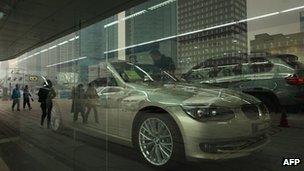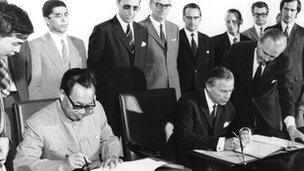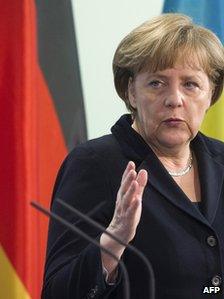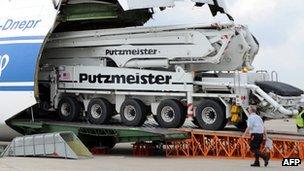German economy: Optimism amidst the slowdown
- Published

Chinese demand for BMWs is booming
They're an optimistic lot, the Germans. Rarely more so, in fact.
Greece may be burning. Growth may be slowing. The talk elsewhere may be of a return to the 1930s.
But the recognised German barometer of hope over fear shows far more Germans looking on the bright side than those down in the dumps.
According to the Allensbach Institute, which has tracked these things rigorously since 1949, 49% polled said they were hopeful of the future, compared with 17% who were fearful.
That's pretty well three smiles to every frown (with 26% showing some scepticism and 8% undecided).
Are Germans happy with the way they are being led? Yes, they are - very much so.
On the latest opinion polls, two of every three Germans said Chancellor Angela Merkel was doing a good job. Three-quarters think she is taking "correct and decisive action" in the eurozone crisis.
It's a glowing picture of satisfaction by the citizenry that stems from the economy.
Unemployment is falling. German exports grew more than 10% last year.
In 2010 and 2011, the economy grew at nearly 4% and last year at 3%, more than decent by European standards.
Latest figures show that it slowed at the end of 2011. The indications are that this year it will grow by about 0.5% - measly by recent standards, but far from the recession expected elsewhere.
Thinking ahead

Germany saw the potential of Chinese trade as early as the 1970s
So what's behind the robustness? China, in a word. And "manufacturing", in another.
The growth of China is fuelling demand by the Chinese new rich for BMWs and demand by Chinese factories for German machinery.
This isn't a fluke. German industrialists foresaw the potential of China when most others saw only turbulence and trouble.
In October 1975 - 37 years ago, when China was in the chaos of the Cultural Revolution - the Financial Times described German policy towards the country: "China could be the next growth market".
Talk about long-term thinking. In ultra-unlikely circumstances - where Chairman Mao was excoriating capitalism and the new Chinese constitution talked of a "dictatorship of the proletariat" - German capitalists had identified the big new market: the People's Republic of China.

Angela Merkel may look stern, but her people are smiling
"The West German approach is typical of the very long-range view that German industry has taken," said the FT.
"At the heart of the approach lies the cultivation of a market, even if the short-term results are not over-encouraging."
Or take this from Die Zeit in the same year: "The image which Germany is trying to project in the largest and most populous developing country in the world is not that of a major political power, but rather of the most important industrial country in the world, a country whose tool-making and mechanical engineering can compete successfully on the world market."
In 1975, British industry was in its perpetual state of crisis at the time, gearing up for what would be the general strike of the Winter of Discontent. The US economy was in recession. But German industrialists were thinking of China as the future.
Social goals
Why did they see it when others didn't? Dr Olaf Ploetner of the European School of Management and Technology in Berlin says that the key decisions were often taken by particular chief executives with vision, but they worked within a German framework of long-term views.
Firstly, German industry isn't particularly profitable. There isn't that high a return in manufacturing, because making cars or machinery demands much costly investment and research and development.
Dr Ploetner told the BBC that this forces companies into looking far ahead. They live on a lower rate of profit, but for a longer period of solidity. "It's interesting that they can exist for so long with small profits," he said, "and this is to do with the owners."
Because a large part of German industry is family-owned, the short-term demands of shareholders, who want quick and relentless rises in the prices of shares, do not matter.
Many German firms, too, are owned by "foundations", often set up by the company's first generation of family founders.
A foundation is an entity which owns something - like a company - but which is not owned by individuals.
The Robert Bosch Foundation, for example, owns 92% of Bosch, the giant engineering company. But the goals of the Robert Bosch Foundation are partly philanthropic, so it doesn't act as profit-maximising shareholders might.
As Dr Ploetner puts it: "All the big companies are organised in foundations, and the foundations do not have 'return on capital employed' as their most important goal. Contribution to society is always a very important point."
It doesn't mean that German companies are charities. But it does mean that German companies are less easily swayed by the vagaries of the moment. Combine that with a very decentralised economy, and you have the picture of solid and steady prosperity.
Hidden champions
If you go to virtually any German small town, there is a good chance that on the outskirts will be a middle-sized family firm which, in its own field, will be in the top three in the world.

Putzmeister concrete pumps are used all over the world
That could be anything from making the cranes for docks, to the glue for embedding the different parts of credit cards together, to making bronze propellers for the world's biggest ships.
Or to making pumps for concrete. But herein, perhaps, lies an omen.
Putzmeister is one of Germany's "hidden champions" - a company that leads the world in its niche.
It was founded by Karl Schlecht near Stuttgart in 1958. Schlecht designed a pump and then turned the idea into a company that went on to lead the market.
Karl Schlecht has just sold this German "hidden champion" - to a Chinese company. It has caused ructions among his employees, who are outraged because it came out of the blue. They protested outside the factory in Swabia.
And it's caused much angst beyond, too. Germans wonder if their great success story is about to be completed - with a Chinese ending.